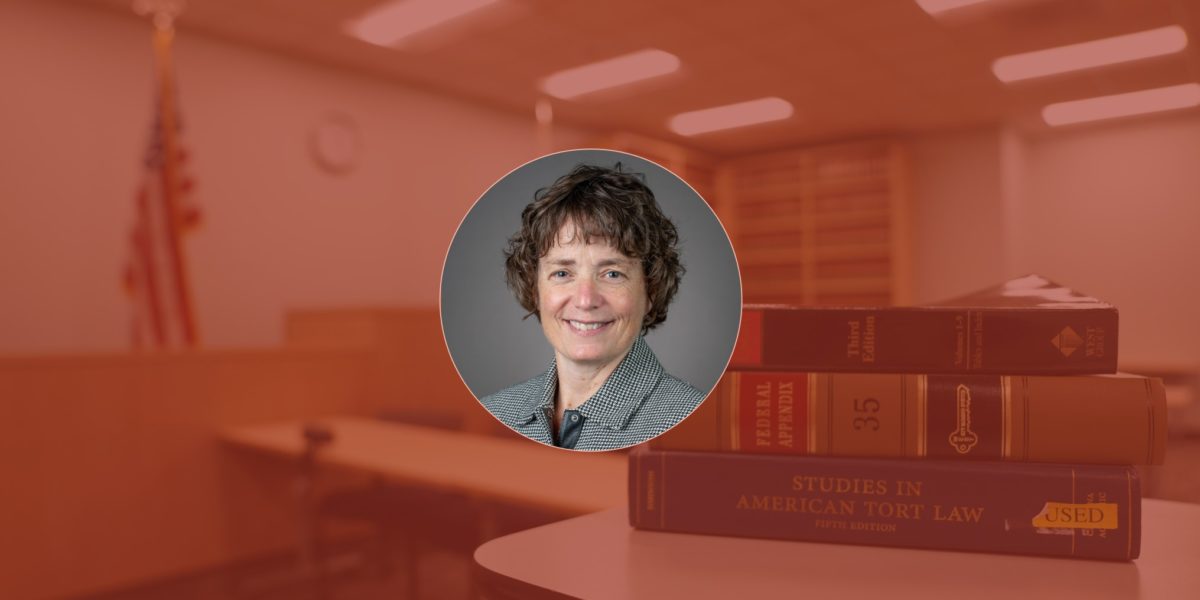Jackie Gardina, J.D., dean and chief academic officer at The Colleges of Law, discusses how the classroom is critical for defending democracy.
I have been thinking a lot about educational gag orders. PEN America is a great resource to learn more about the growing number of laws dictating what can and cannot be taught.
The battle for democracy doesn’t start in Congress, the state legislatures, or even the voting booth; it starts in the classroom. Education is the linchpin of democracy. Attacks on education are attacks on democracy. They needed to be treated as such.
Let me share a personal story to illustrate my point. Almost 40 years ago, I took an undergraduate history class on World War II with professor Larry Gelfand, Ph.D., a well-respected teacher and scholar at the University of Iowa. Dr. Gelfand was in the infantry during WWII and fought the Battle of Okinawa, a fierce battle that resulted in nearly 50,000 American casualties and more than 12,000 American deaths. During the class, we examined our nation’s wartime decisions, from entering the war to dropping the atomic bomb. Up to this point, I had been exposed to only a one-dimensional view of the war, one in which the U.S.’s actions were largely unexamined. I remember Dr. Gelfand asking why the Battle of Okinawa was necessary if President Truman planned to bomb Hiroshima and Nagasaki. He didn’t posit an answer, he just left the question hanging in the air. It was a powerful teaching moment.
I returned home and with all the hubris of a 19-year-old indignantly presented the question to my parents. They did not react well. My dad was a WWII veteran, and they had lived through the war. They said I didn’t understand the complexities of the time. And they were right, I didn’t. But it spurred me to think more critically about U.S. history and policies.
Unfortunately, students in many states are now being denied that same powerful moment. Over the last two years, state legislatures have introduced hundreds of laws intended to prohibit or restrict what is taught in public schools, colleges, and universities. Most of the laws target discussions of race, racism, sexual orientation, gender, and even American history. The vague and sweeping language of these bills—such as South Carolina’s prohibition against discussing any topic that creates “discomfort, guilt, or anguish” based on political belief—combined with the potential monetary penalties, place institutions and educators in an untenable position. When you add the divisive and sometimes violent rhetoric around these proposals, they effectively chill speech.
But these bills do more than stall a student’s development or chill an educator’s speech—they undermine democracy. The founders believed that an educated public was essential to self-government. Thomas Jefferson opined that we must “educate and inform the whole mass of the people … they are the only sure reliance for the preservation of our liberty.” Franklin D. Roosevelt, the very president I was critiquing in Dr. Gelfand’s class, echoed Jefferson’s sentiment:
“Democracy cannot succeed unless those who express their choice are prepared to choose wisely. The real safeguard of democracy, therefore, is education … to prepare each citizen to choose wisely and to enable him to choose freely are paramount functions of the schools in democracy.”
In short, education was perceived to be a bulwark against tyranny.
History provides evidence that autocratic governments seek to influence or, in some cases, prohibit citizens from obtaining an education. When Adolph Hitler came to power, he immediately made changes to the school curriculum, seeking to reduce resistance to fascist ideas. The German Student Union burned books deemed subversive or opposed to Nazi ideology. German citizens identified as Jewish were pushed out of public schools. Undermining education was a critical step in securing an obedient citizenry.
In the U.S., southern states passed laws prohibiting enslaved people from learning to read and write. North Carolina passed a statute that made it a crime for any free person to teach any enslaved person how to read or to provide them any reading material. The state feared that if enslaved people became literate, they would question their slave status and rebel.
Today’s laws are presented as protecting students from an undefined so-called woke ideology. (It isn’t a secret; the Florida Legislature adopted a law commonly referred to as the Stop WOKE Act.) Woke is thrown around today in much the same way Communist was bandied about during the McCarthy era. During that time, educators believed to be Communist sympathizers were considered dangerous influences on the public, much like educators deemed to be “woke” face monetary penalties and disciplinary action today.
Forty years ago, Dr. Gelfand invited students to critically examine decisions made by the U.S. He asked students to recognize the complexity of the moment and the political and moral compromises made. In some states today, students will not have the same freedom to scrutinize slavery, Reconstruction, the Jim Crow era, and the vestiges that linger today.
If we want to move this country toward that “more perfect union” first contemplated in the Preamble of the Constitution, we must critically examine our past to create a better future. I will end where I started: Education is the linchpin of democracy. We need to treat the attacks on education with the same passion we treat the attacks on voting rights.
——–
To learn more about the J.D., Hybrid J.D., and Master of Arts in Law programs at The Colleges of Law, fill out the form below.

